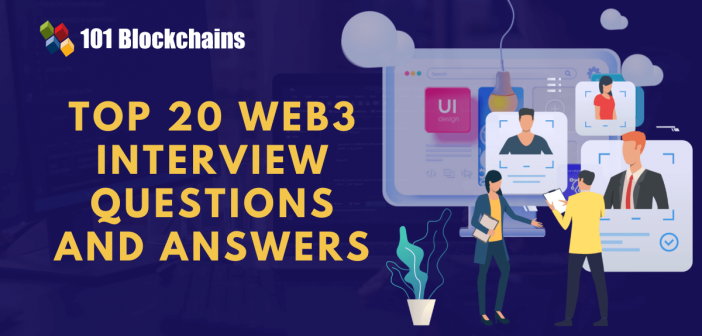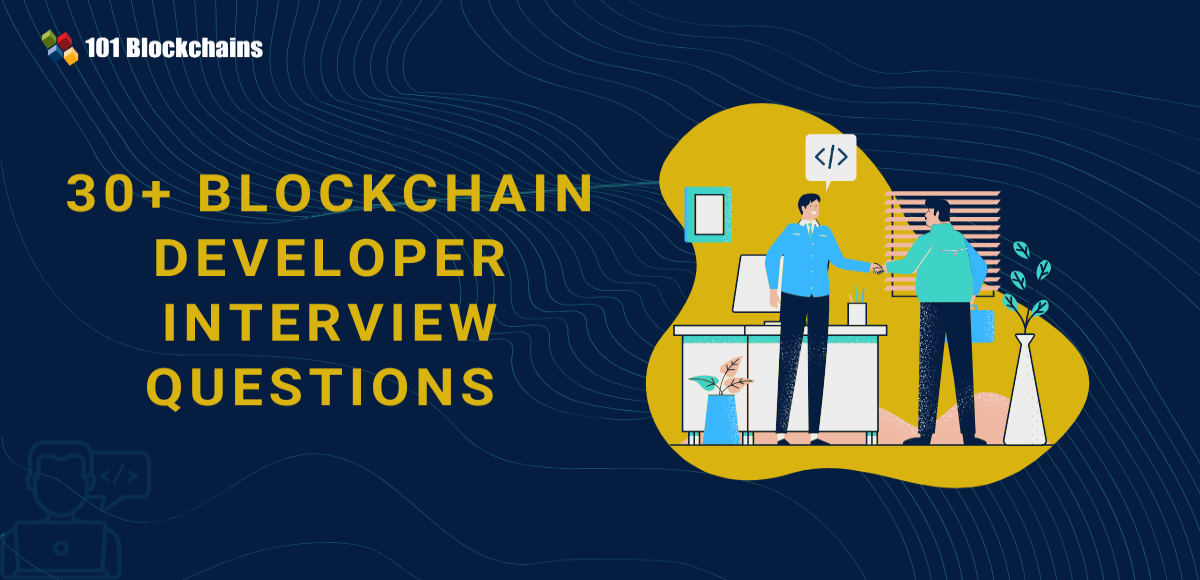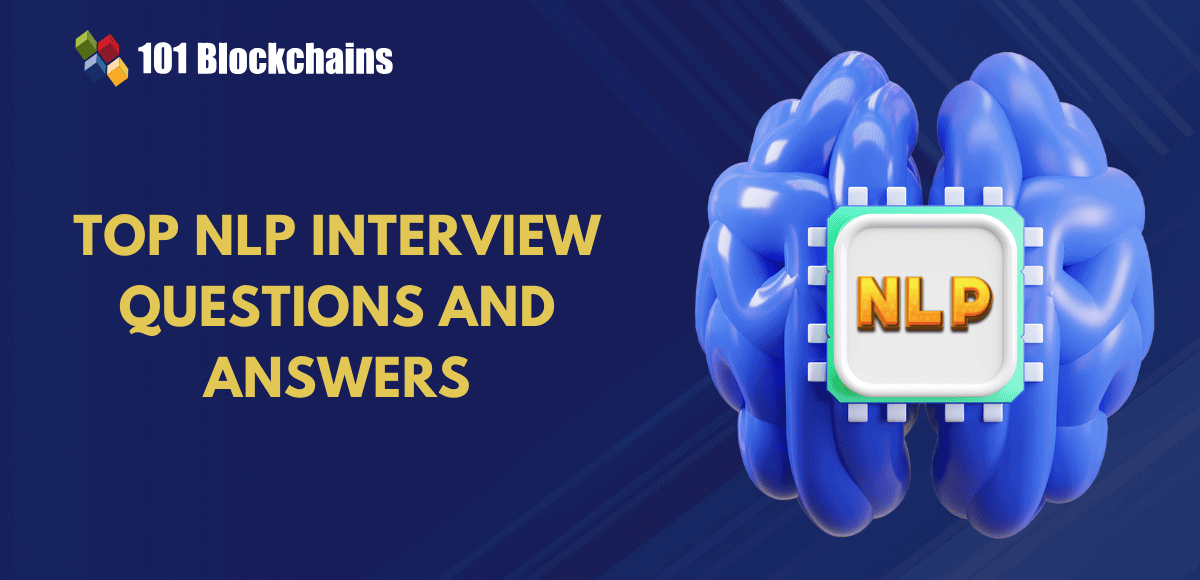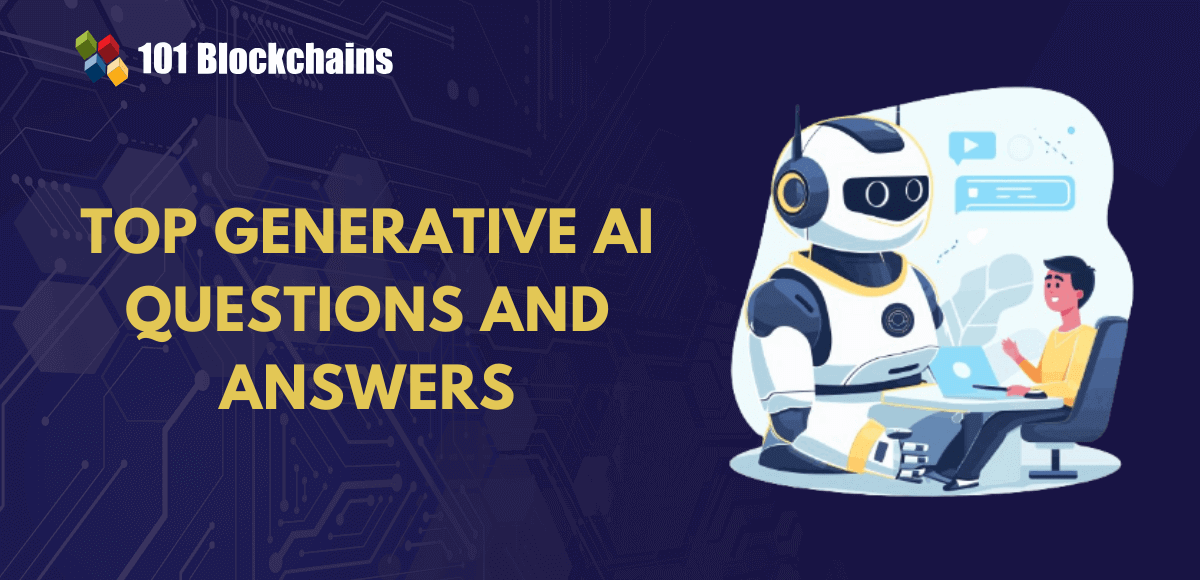Learn how blockchain truly works, master key definitions, and uncover what makes smart contracts so "smart." Dive into the fundamentals, gain valuable insights, and start your blockchain journey today!

- Interview Preparation
Georgia Weston
- on January 31, 2023
Top 20 Web3 Interview Questions and Answers
Web3 has stirred the world with the promises of a decentralized and semantic internet. While the tech community was busy with discussions on cryptocurrencies, DeFi solutions, NFTs and the applications of blockchain, web3 had already started developing as the umbrella term. Web3 encompasses anything decentralized, thereby bringing the comprehensive array of blockchain solutions under its shadow.
Even if the term was coined back in 2014, web3 has become a phenomenal trend in the tech landscape now. The growing number of web3 jobs, along with lucrative salary prospects due to enormous skill gaps in web3, encourage professionals to pursue a career in web3. However, it is important to prepare for the toughest challenges while preparing for jobs in the web3 domain.
Candidates interested in web3 careers could opt for different training courses on blockchain technology, NFTs, DeFi and tokenization. At the same time, web3 certifications can also help professionals establish proof of their fluency in web3 concepts and terms. Subsequently, candidates must prepare for web3 interview questions to qualify for technical interviews conducted by employers. Interviews serve as exclusive opportunities for employers to test the web3 expertise of candidates. Let us take a look at the common questions asked in web3 job interviews across different categories.
Most Popular Web3 Interview Questions
The concept of a decentralized internet with web3 showcases possibilities for vesting control in the hands of users rather than centralized corporations. Web3 use cases in blockchain applications, metaverse, DeFi and NFTs indicate the variety of job roles available for web3 professionals.
In addition, the prospects of better salaries in web3 roles also increase interest in web3 questions and answers. For example, a web 3.0 developer could earn an annual average salary ranging from $70,000 to $350,000.
Big brands are entering the web3 space to stay updated with the latest trends, thereby expanding the scope for career development. You can capitalize on the opportunities for a career in web3 by preparing for the following categories of web 3.0 interview questions.
Curious to develop an in-depth understanding of web3 application development? Join Standard/Premium Plan and get free access to Web3 Application Development Course!
Common Web3 Interview Questions
The first response to “What do I need to learn to work in Web3?” would point to web 3.0 fundamentals. Here is an outline of the common questions asked about web3 fundamentals in web3 job interviews.
1. What is Web3?
The obvious first question interviewers might ask you would focus on the definition of web3. You can define web3 as the successor of web 2.0 or the third generation of the internet. Web3 utilizes different technologies such as blockchain, machine learning, IoT and big data to enable websites and applications to manage data just like humans. The primary goal of web3 revolves around the creation of a more transparent, independent and smart internet. One of the biggest highlights in web3.0 examples is the emphasis on decentralization which would prevent centralized applications from interfering with user data.
2. What is decentralization?
Decentralization is the process of distributing power and authority among all participants in a network. In the case of web3, decentralization focuses on transferring the authority over data management away from centralized tech giants such as Google and Facebook. The most common blockchain interview questions related to web3 focus on decentralization and how it helps in creating a distributed model for user data storage and management. Decentralization offers significant benefits for web3 in the form of a trustworthy and transparent environment alongside precision in data reconciliation.
Want to understand the fundamentals of the Internet of Things (IoT)? Join Standard/Premium Plan and get free access to IoT Fundamentals Course!
3. How will web3 revolutionize the online user experience?
The impact of web3 explained in detail would showcase its potential for transforming user experiences. New features and traits of the internet in web3 would play a crucial role in revolutionizing online user experiences. Web3 would introduce the facility for integrating virtual and augmented reality alongside improving security and privacy for users. AI and ML capabilities, along with IoT integration, could help with improved search capabilities alongside enhancing data analytics.
4. What are consensus algorithms?
Consensus algorithms are a protocol used in blockchain networks for reaching an agreement regarding specific decisions. The interview questions for web3 jobs could also require candidates to expand their answers by mentioning the essential consensus algorithms. As of now, the three most popular consensus algorithms include the Proof of Work, Proof of Stake and Delegated Proof of Stake consensus mechanisms. Each consensus mechanism follows a distinct approach for verifying transactions and agreeing on the inclusion of the next block.
Build your identity as a certified blockchain expert with 101 Blockchains’ Blockchain Certifications designed to provide enhanced career prospects.
5. How do the popular consensus algorithms differ from each other?
The two most commonly used consensus algorithms are Proof of Work and Proof of Stake. You can expect such blockchain interview questions to prove your fluency in web3 fundamentals. Proof of Work consensus involves the computation of mathematical puzzles, and miners compete with each other to find solutions faster than others. The miners who solve the puzzles successfully before others would receive the rewards. On the other hand, Proof of Stake consensus relies on users staking their digital assets in the blockchain network. Users with the highest stakes are more likely to get the chance to exercise their vote in the consensus process.
Advanced Web3 Interview Questions
The outline of interview questions for web 3.0 jobs would also include advanced questions for testing your industry knowledge. Here are some of the advanced interview questions you should learn before web3 job interviews.
6. How do NFTs fit in the web3 landscape?
NFTs or non-fungible tokens are created by using blockchain. Aspiring web3 professionals can find answers to “What do I need to learn to work in web3?” by identifying how non-fungible tokens work in web3. Blockchain is the connecting link between NFTs and web3. Non-fungible tokens could play a vital role in web3 for offering transparent proof of ownership for digital assets. In addition, NFTs could also serve as the foundations of decentralized identity with NFT verification systems. For example, NFT profile pictures on social media. Furthermore, NFTs could also encourage the expansion of the web3 community with the facility of voting rights and exclusive membership privileges.
Aspiring to Become a Certified NFT Expert? Enroll in Certified NFT Professional (CNFTP) Course Now!
7. Are web3 and metaverse the same thing?
The list of web3 questions would also emphasize the confusion with metaverse. Most people assume that the metaverse is web3 technology personified on a digital platform. However, web3 and metaverse are completely different terms with their own meaning. You can assume that the metaverse is a subset in the domain of web3. The metaverse is an open, shared, persistent and immersive 3D environment with multiple digital spaces operating on decentralized and interoperable networks. On the other hand, web3 is the overarching principle guiding the decentralization of conventional applications, systems and processes.
8. Is DeFi relevant for web3?
The biggest contributor to the expansion of the web3 movement is decentralized finance or DeFi. Starting from cryptocurrencies to decentralized lending/borrowing platforms, DeFi has changed many conventional financial systems. DeFi is one of the prominent web3.0 examples which show how web3 concepts can introduce new benchmarks of efficiency and productivity in traditional services. Decentralized finance complies with the basic objective of web3 for empowering users with access to their assets and data without involving centralized intermediaries.
Want to learn and understand the scope and purpose of DeFi? Enroll Now in Introduction to DeFi- Decentralized Finance Course
9. What is the blockchain trilemma?
Considering the significance of blockchain for web3 development, it is important to understand the blockchain trilemma. It is a concept which revolves around three important factors security, scalability and decentralization in blockchain networks. According to the blockchain trilemma, you can design a blockchain protocol only by choosing two factors and compromising with the other.
10. Is there any solution to the blockchain trilemma in web3?
The next entry among web3 interview questions would draw attention towards potential solutions for resolving blockchain trilemma. Most blockchain-based solutions have to compromise on scalability to ensure the advantages of decentralization and security. However, layer 2 blockchain networks could offer credible solutions to the problem of managing security, scalability and decentralization for web3 applications.
Get familiar with the terms related to blockchain with Blockchain Basics Flashcards.
Technical Interview Questions
The major share of interview questions for web3 jobs would focus on the technicalities associated with web 3.0. Here is an outline of the important technical questions you can expect in a web3 job interview.
11. What are the notable risks associated with web3?
The domain of web3 is susceptible to security, irrespective of the advantages of cryptographic security with blockchain. Some of the prominent security risks in web3 include smart contract manipulation, confidentiality breaches, monetary losses and rug pull scams.
12. Which programming languages are used in web3 development?
The responses to “What do I need to learn to work in web3?” would also highlight the important programming languages for creating web3 solutions. You would need front-end and backend programming languages such as JavaScript, C++ and Python for web3 use cases. In addition, smart contract programming languages such as Solidity are an essential requirement for web3 development.
Want to get an in-depth understanding of Solidity concepts? Join Standard/Premium Plan and get free access to Solidity Fundamentals Course Now!
13. What are the difficulties in generating random numbers in smart contracts?
Smart contracts developed using Solidity are deterministic in nature. Without the ability to identify the mechanism underlying the generation of random numbers in smart contracts, no one could exploit the application by anticipating the results.
14. Do you have to compile smart contracts coded in Solidity and Vyper?
Solidity and Vyper are popular choices for smart contract programming in web3 applications. Most of the web 3.0 examples would feature smart contracts scripted in these high-level programming languages. Therefore, the EVM could not understand code written in these languages, thereby calling for compilation to translate source code into machine language before execution.
Excited to learn about the key elements of Solidity? Check the presentation Now on Introduction To Solidity
15. What are the naming guidelines for functions and contracts in Solidity?
The technical interview questions for web3 job roles regarding Solidity would also evaluate your knowledge of the Solidity guide. Awareness of the naming conventions for Solidity contracts and functions could help in efficient coding. All the contract names in Solidity must be capitalized, such as TrialContract. On the other hand, function names should feature mixed-case such as effectiveEfficientFunction.
16. Can you identify some of the top examples of web3 organizations?
Popular examples of web3 platforms such as Steemit, Everledger, OpenSea and Augur showcase the potential of web3. Uniswap, a popular crypto exchange, also serves as one of the notable examples of web3. OpenSea offers a popular NFT marketplace, while Steemit works as a social network and blogging platform.
Learn more about Web 3.0 fundamentals through AN INTRODUCTION TO WEB 3.0 BLOCKCHAIN Ebook
17. How will DAOs work in the web landscape?
DAOs or decentralized autonomous organizations are also alternatives to blockchain interview questions you might come across in web3 job interviews. DAOs resolve the prominent concern of centralized ownership over organizations. The design of decentralized autonomous organizations focuses on distributed resources and power in an organization with transparency. DAOs can offer the ideal structure for the rise of web3 organizations with principles of community-based governance.
18. What do you know about semantic web stack?
The semantic web stack refers to a collection of technologies which work in unison to create useful and meaningful web experiences. A detailed outline of web3 explained to experts would reflect on important technologies included in the semantic web stack. For example, SPARQL, RDF and OWL enable personalized web experiences alongside the assurance of intelligent search results for users.
Curious to know whether web 3.0 will play an important part in the future of the internet? Check the detailed guide Now on The Insane Future Of Web3
19. How is API different from microservice architecture?
APIs are a collection of protocols and procedures which help two different software applications interact with each other. On the other hand, microservice architecture involves designing an application with a collection of small, independent services which can interact with each other.
20. Will machine learning affect web3?
Yes, machine learning is a powerful instrument for revolutionizing the development of the web3 landscape. At the same time, awareness of potential risks and challenges associated with machine learning algorithms is critical for ensuring their effective implementation. Errors in machine learning algorithms could lead to inaccurate or biased results, thereby affecting the web3 user experience.
Build your fluency in advanced technologies and develop decentralized solutions for the emerging web3 ecosystem as a web3 expert through Web3 Expert Career Path
Bottom Line
The different categories of web3 interview questions reflect various levels of the web3 landscape. Starting from general questions about web3 to the technologies involved in web3, interviewers would evaluate your web3 expertise in a comprehensive manner. Therefore, it is important to choose trustworthy training resources for familiarizing with web3 concepts and gaining expertise. Apart from theoretical training, you must have expertise in web3 development and a detailed understanding of technologies associated with web3. Learn more about web 3.0 and prepare for a lucrative career now.
*Disclaimer: The article should not be taken as, and is not intended to provide any investment advice. Claims made in this article do not constitute investment advice and should not be taken as such. 101 Blockchains shall not be responsible for any loss sustained by any person who relies on this article. Do your own research!







